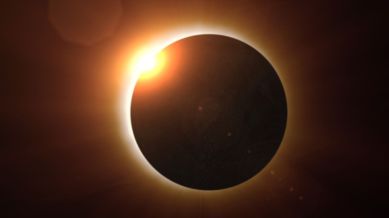📣 For more lifestyle news, click here to join our WhatsApp Channel and also follow us on Instagram
Solar Eclipse 2024: Not just with the naked eye, you must not look at a solar eclipse through telescopes, binoculars, or even cameras — here’s why
Solar Eclipse 2024: Skywatchers are eager for a glimpse of the total solar eclipse set to hit North America, but amidst the excitement of witnessing this once-in-a-lifetime event, a crucial question arises: is it safe to look directly at the eclipse?

Remember how your grandma would tell you not to go out of the house during a solar eclipse? Grahan lag jata hai. Though the practice may be superstitious, it does hold a deeper meaning, one that becomes clear as the awe-inspiring spectacle of a total solar eclipse is all set to grace the North American continent on April 9.
Skywatchers are eager for a glimpse of the phenomenon, but amidst the excitement of witnessing this once-in-a-lifetime event, a crucial question arises: is it safe to look directly at the eclipse — with your naked eye, or even with an optical instrument like a telescope or a pair of binoculars?
monthly limit of free stories.
with an Express account.
Dr Samir Sud, co-founder and director of Sharp Sight Eye Hospitals, sheds light on the hidden dangers and offers safe alternatives for experiencing this celestial phenomenon.
The burning truth: Why naked eyes are no match for the Sun
While a solar eclipse dims the sun’s visible light, it doesn’t diminish the invisible threat – ultraviolet (UV) rays. These powerful rays, undetectable by the human eye, can wreak havoc on our vision, noted Dr Sud.
Normally, the discomfort from staring at the bright sun triggers our blink reflex, offering some protection. However, during an eclipse, this reflex weakens, allowing prolonged exposure, explained Dr Sud. The consequence? Solar retinopathy — a condition where UV rays burn retinal cells, causing permanent vision loss. Unlike skin, the retina cannot regenerate, making this damage irreversible, Dr Sud warned.
Beyond the naked eye: Why optical instruments don’t save the day
Looking at the eclipse through telescopes, binoculars, or even cameras might seem like a safe way to magnify the view. But NASA strongly advises against it. Dr Sud explained that these instruments act like magnifying glasses, concentrating the sun’s rays onto a smaller area of the retina, intensifying the damage and potentially causing immediate vision problems.
“Just like focusing sunlight with a magnifying glass can start a fire, focusing it on your retina can burn it,” he told indianexpress.com in an interaction.
Safeguarding your sight: The power of proper protection
Dr Sud said the key to safe eclipse viewing lies in specialised equipment – solar eclipse glasses. He explained that these glasses are specifically designed to block harmful UV and infrared radiation while allowing a safe glimpse of the eclipse.
They strike a perfect balance between quenching our curiosity about the cosmos and protecting our eyes from the sun’s immense power.
So, the next time a solar eclipse graces the night sky, remember: prioritise your safety. Invest in a pair of certified solar eclipse glasses and witness this celestial marvel responsibly. Your eyes will thank you for it.
📣 For more lifestyle news, click here to join our WhatsApp Channel and also follow us on Instagram